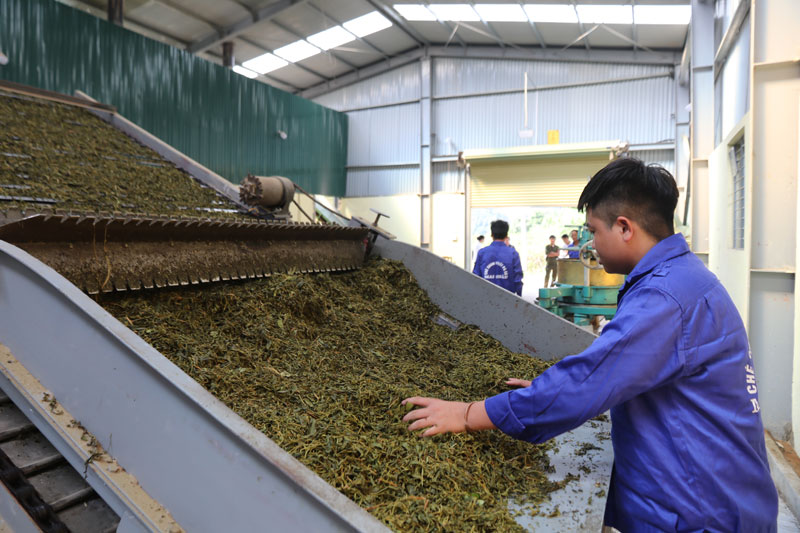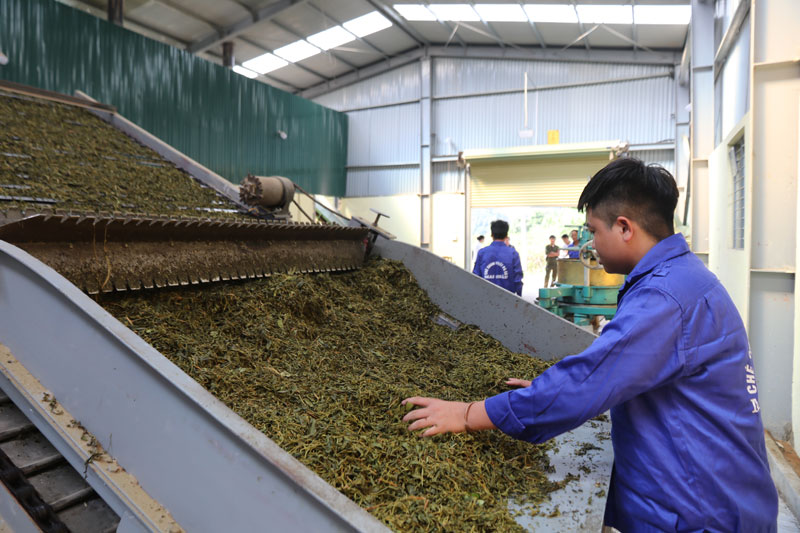
(HBO) - A Shan tuyet tea processing workshop was put into use in Pa Co commune in late May, which is considered a milestone in the strategy for sustainable development of production activities of Mong ethnic people in Mai Chau district.
Chairman of the Pa Co communal People’s Committee Sung A Mang said to
local residents, the tea processing facility, jointly invested by the State and
a business, has created a big opportunity for local economic development.
 The inauguration of the tea processing workshop,
invested with 3 billion VND by the State, has helped purchase Shan tuyet tea
from Pa Co residents in a timely manner.
The inauguration of the tea processing workshop,
invested with 3 billion VND by the State, has helped purchase Shan tuyet tea
from Pa Co residents in a timely manner.
The tea processing workshop in Pa Co commune was
invested with an estimated 4.5 billion VND (over 193,500 USD), including about
3 billion VND funded by the province’s budget. The remaining 1.5 billion VND
and the land were contributed by the Phuong Huyen plant seedling production and
business Co. Ltd.
The workshop is designed to process about 5
tonnes of fresh tea buds a day, but the current material supply is equivalent
to just one-third of the facility’s capacity. With the inauguration of this
facility, locals now no longer have to travel far to sell their tea.
Of the nearly 1,000ha of farmland in Pa Co
commune, there are 115ha of Shan tuyet tea trees, and 85ha of the area are
being harvested, generating 160 tonnes of tea leaves each year. Notably, about
760ha of the local farmland are under maize, but the income from this plant is
equivalent to only one-third of that from tea trees. Therefore, there remains
huge potential to develop Shan tuyet tea trees in Pa Co.
The commune’s tea output is aimed at 300 tonnes
of fresh buds annually by 2020. The operation of the tea processing facility in
Pa Co will help expand the tea farming area by replacing maize with tea trees
on hundreds of ha of land in not only Pa Co but also the neighbouring commune
of Hang Kia.
Vice Chairman of the Hoa Binh provincial
People’s Committee Bui Van Cuu said developing tea farming associated with
ecological and community-based tourism is a policy for the Mong ethnic
community in Mai Chau district in the years to come. With about 1,500 old tea
trees and farming expansion efforts, Shan tuyet tea trees will be the driver of
development in Hang Kia and Pa Co in the near future./.
According to data from the Hoa Binh Provincial Party Committee, the industrial production index for the first six months of 2025 is estimated to have increased by 20% compared to the same period last year. This marks the highest year-on-year growth rate for this period since 2020.
In the first six months of 2025, Hoa Binh province’s export turnover was estimated at 1.145 billion USD, marking an 18.11% increase compared to the same period in 2024. Import turnover was estimated at $ 804 million, a 17.15% increase, which helped the province maintain a positive trade balance.
The lives of the ethnic minority farmers in Tan Lac district have gradually improved thanks to the new directions in agricultural production. This is a testament to the collective strength fostered through the professional associations and groups implemented by various levels of the district’s Farmers’ Union.
With the motto the "product quality comes first,” after nearly one year of establishment and operation, Muong village’s Clean Food Agricultural and Commercial Cooperative, located in Cau Hamlet, Hung Son Commune (Kim Boi district), has launched reputable, high-quality agricultural products to the market that are well-received by consumers. The products such as Muong village’s pork sausage, salt-cured chicken, and salt-cured pork hocks have gradually carved out a place in the market and they are on the path to obtaining the OCOP certification.
In the past, the phrase "bumper harvest, rock-bottom prices" was a familiar refrain for Vietnamese farmers engaged in fragmented, small-scale agriculture. But today, a new spirit is emerging across rural areas of Hoa Binh province - one of collaboration, organisation, and collective economic models that provide a stable foundation for production.
Maintaining growing area codes and packing facility codes in accordance with regulations is a mandatory requirement for agricultural products to be eligible for export. Recently, the Department of Agriculture and Environment of Hoa Binh province has intensified technical supervision of designated farming areas and packing facilities to safeguard the "green passport" that enables its products to access international markets.



 The inauguration of the tea processing workshop,
invested with 3 billion VND by the State, has helped purchase Shan tuyet tea
from Pa Co residents in a timely manner.
The inauguration of the tea processing workshop,
invested with 3 billion VND by the State, has helped purchase Shan tuyet tea
from Pa Co residents in a timely manner.